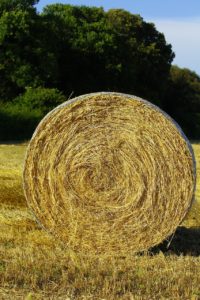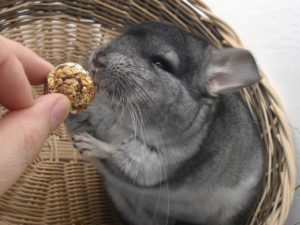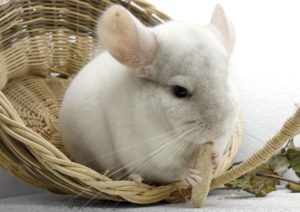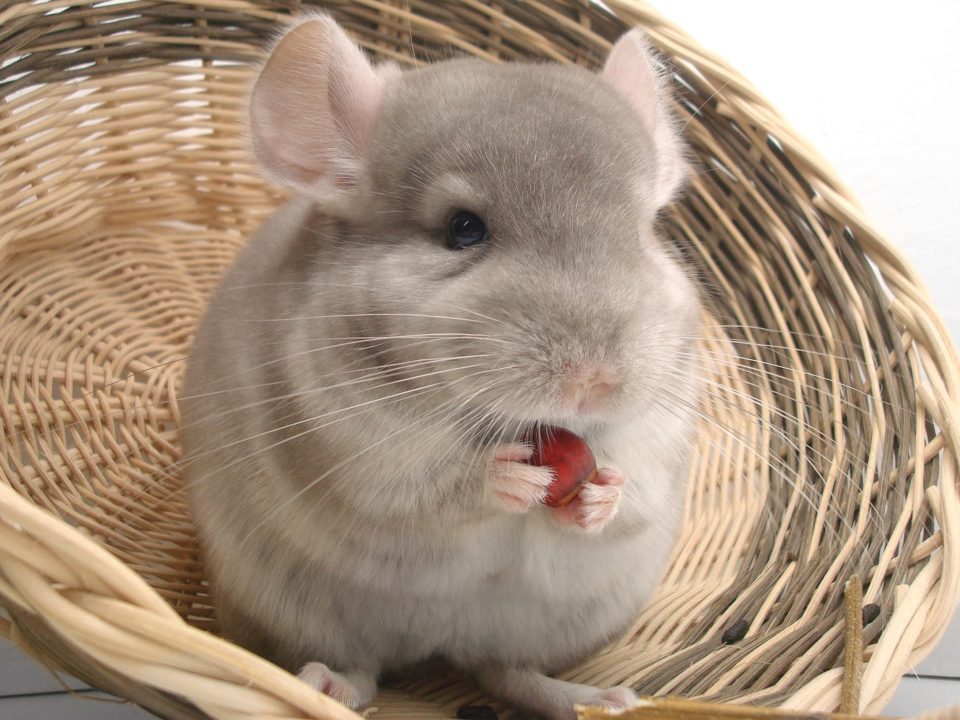Hey there! My name is Casey and I am a former veterinary technician of 7 years where I was given the fantastic opportunity to treat and care for many different pets!
Aside from dogs and cats, I’ve treated numerous pocket pets, reptiles and birds! One of my top favorites to see and treat has always been the Chinchilla.
These adorable furballs can be your best friend for many many years, with a lifespan of 15 to 22 years!
Chinchillas are what is considered to be an intermediate pet due to their highly sensitive digestive tracts.
If you’re here reading this, then that means you’re taking the first steps in ensuring your chinchilla buddy remains happy and healthy for many years!
As stated before Chinchilla’s have very sensitive digestive tracts, meaning even the smallest changes must be gradual and carried out over several days!
Chinchilla Diet Overview
 As a rule, chinchillas need plenty of fiber in their diet. In the wild, chinchillas naturally chew bark from trees, twigs, and firm stemmed stalks. Similar to rabbits, gerbils, and guinea pigs, chinchillas require a consistent source of fresh fiber heavy hay in their diet. The fiber helps keep their digestive system working correctly.
As a rule, chinchillas need plenty of fiber in their diet. In the wild, chinchillas naturally chew bark from trees, twigs, and firm stemmed stalks. Similar to rabbits, gerbils, and guinea pigs, chinchillas require a consistent source of fresh fiber heavy hay in their diet. The fiber helps keep their digestive system working correctly.
The inclusion of fiber is not only good for their digestive tract but their teeth as well! Like other rodents, chinchilla teeth are open-rooted and consistently growing. Ensuring your chinchilla has plenty of fiber heavy roughage like hay, along with other things to chew on – such as wooden toys or treats – is key to keeping your chin healthy and happy.
Alongside fiber, chinchillas need a healthy dose of protein and carbohydrates. A high-quality pelleted food made specifically for chinchillas will provide all three of these key components and overall will be a well-balanced twice a day meal.
Since chinchillas are nocturnal, they are most active in the middle of the night and early mornings.
Having a scheduled routine in place will help maintain your chinchilla’s comfort, many owners go with feeding a tablespoon of pelleted food twice per day, such as in the evenings and early mornings.
This often fits in a typical work schedule and is a great way to keep your chinchilla happy.
What To Avoid For Chinchillas
Like all pets, there are going to be certain things to avoid in a chinchillas diet. First, two things on the list are to avoid foods that are high in moisture and fat!
While keeping a fresh supply of water available at all times is necessary, chinchillas don’t need moisture in their food!
Moist food can, in fact, upset a chinchillas tummy and cause life-threatening diarrhea. Some examples of moist food and treats to avoid include lettuce, cabbage, bananas, and broccoli.
The same goes for fatty foods and treats such as nuts and seeds.
There are of course more foods to avoid, however, since there are so many I’d suggest you research any and all foods and treats you want to give your chinchilla before doing so.
Another option is to speak with your veterinarian about healthy treats you can give at home! If you have an idea of what you’d like to give, just ask! When it comes to our beloved chins, it’s better to be safe than sorry.
Avoid mixed food blends as a primary diet. While these types of blends can be very well balanced in the bag, they only really work for your chinchilla if they eat all that’s included and usually when it comes to mixed diets, your chinchilla is more likely to pick their favorite parts out and leave the rest.
Typically these diets are filled with what is considered treat options, so do well to be mixed with a pelleted diet.
I know it was stated above, but I can’t stress enough that chinchillas have a very sensitive digestive tract!
Which means you should be very cautious in the introduction of new foods to your chinchilla’s diet! Go slow and monitor your chin every step of the way.
You may or may not have known, but chinchillas, like rabbits, are coprophages, meaning they will sometimes eat their own stool.
This is perfectly normal and helps them get additional nutrients into their system. So when you see your little furry friend eating their own poo, don’t discourage it!
Treats for Chinchillas

When it comes to treats we need to face some facts. As much as our little furballs enjoy getting something different, the process of giving treats is mostly for us and occasionally, training purposes.
Like most things, moderation is key when it comes to providing treats for our little friends. Keep in mind when looking through pets stores, if it’s colorful and shaped oddly, it’s a treat!
Some good treat options for your chins include non-frosted shredded Wheaties, old fashioned rolled oats, alfalfa hay, rose hips, marigold, honeysuckle, and many other chinchilla safe herbs.
When in doubt, call your vet! They will be able to provide a list of healthy treat options for you to try.
Monitor Your Chinchilla
Developing a good routine with your chinchilla is the best way to ensure they remain happy and most of all, healthy.
You want your chinchilla to thrive for many years, so adding some checks to your routine will go a long way in maintaining your fur baby’s health.
These, of course, can be done in any order that fits your preferences. Just be sure to include them all!
Firstly, you’re going to want to check the water and freshen it up every day.
Next, the hay, keeping a continuous source of fresh hay is important, if you find any hay that seems old or has moisture or mold on it then clean it out right away and replace with a fresh batch!
Third, check their food! You want to make sure they are eating a good amount of healthy pellets and that their intake remains consistent.
Fourth, you’re going to want to keep an eye on both the amount and size of your chinchilla’s droppings.
Since they produce two dropping types, the kind they eat and the kind they just drop, it’s a good indicator of their health status.
If their droppings are suddenly fewer than normal or are smaller than their typical size, or scarily, is diarrhea that means its a good idea to call your vet immediately!
If you see diarrhea you can safely consider that an emergency and need to take your chin to the vet right away!
Finally, look over your little chinchilla buddy! A shiny coat, bright eyes, healthy weight and plenty of energy are all great signs that your little friend is thriving and doing well in your care!
Now that we’ve reviewed the important facts about our chinchilla’s diets, let’s take a look at some high-quality food, treat, and hay options.
Best Food For Chinchillas
1. Oxbow Animal Health Chinchilla Fortified Small Animal Feeds
The Oxbow brand has always been a top favorite for me when it comes to my pocket pet foods as it has always done well to meet the unique dietary needs of all my pocket pets.
When it comes to chinchillas and their sensitive stomachs, this diet is great as it has been formulated to meet their highly specific dietary needs.
With the first ingredient being alfalfa hay to provide your chinchillas with some much-needed and essential fiber and protein, this diet ensures a healthy digestive system.
This diet also contains wholesome ingredients and vital nutrients to support daily function and performance.
The best part of this diet is that it in an easy to eat pelleted form. As stated above, this prevents selective eating and allows your chinchillas to get a highly nutritious meal of fortified food that will make up about 20% of their overall diet.
This pelleted form will also aid in your chinchilla’s dental health as the crunching and gnawing will help keep their teeth ground down to an appropriate length and prevent overgrown teeth.
When fed in conjunction with high-quality hay, this Chinchilla Fortified diet completes the dietary needs puzzle and ensures a happy and healthy fur baby.
2. Kaytee Fiesta Food Chinchillas
If you’re looking for a high-quality treat option, then consider this Kaytee Fiesta Food.
It contains a premium and fortified blend of fruits, vegetables, seeds, and grains, along with some nutritious, fiber-packed pellets.
The Kaytee Fiesta diet has a variety of shapes and colors to offer maximum fun for our chinchillas. This diet has the addition of prebiotics and probiotics to support digestive health. Keep in mind with this diet, that it is mostly made up of fat containing treats!
Your chinchilla will most likely dig out the treats and ignore the pellets, so moderation of this treat-diet is key to keeping your fur baby healthy and happy.
My suggestion, if you want to provide your chin with some variety, is to mix this diet with a high-quality pelleted version, so that the majority of each feeding contains the pellets with just a few treats mixed in for your chins enjoyment.
3. Small Pet Select 2nd Cutting “Perfect Blend” Timothy Hay Pet Food
Timothy hay is one of the most important staples for roughage eating pocket pet diets. This is especially true for the sensitive digestive tracts of our little chinchilla buddies.
Timothy hay is my go-to suggestion as it provides a healthy amount of fiber to keep things moving!
Second cut hay refers to hay that has been harvested once, then allowed to re-grow to be harvested again.
Unlike the coarse stems and seed head heavy first cut hay, when it comes to the second cut, the stems are softer and less coarse, have fewer seed heads and are leafier. Meanwhile, the third cut is the softest and leafiest, providing the least amount of fiber.
The second cut hay option has adequate fiber, good firmness for keeping teeth ground down, and a delicious flavor that chins adore.
This Small Pet Select 2nd cutting Timothy hay is perfect for all my pocket pets, especially the chins I’ve treated! When it comes to hay, the second cut is often the most popular as it brings together the best of both first and third cuts!
The hay comes fresh to your doorstep, sealed in a box that keeps the hay beautifully green, soft, sweet tasting, and so fragrant you can practically smell the meadows.
Final Thoughts
Chinchillas make fantastic additions to the family, their long lifespan of a minimum 15 years makes them great long term companions.
These little furballs are listed as an intermediate pet due to their highly sensitive digestive tract, meaning you’re definitely going to want to take the utmost caution when introducing new treats and foods.
Hay-based pelleted foods are best, as mixed food type brands are packed full of what I consider junk food for your chins.
Chinchillas require about 80% roughage in their diet, so providing consistent access to hay is ideal, along with fresh water and scheduled pellet feedings twice per day.

There are some great brands out there both available to order online and at your local pet store. With any new chinchilla you get, I recommend having them checked out by your chosen vet for a clean bill of health!
Chinchillas are for the dedicated pet owner, and are well worth it! Welcome to the world of Chinchillas, this is the adventure of a lifetime!
If you have any questions or comments, please leave them below!


